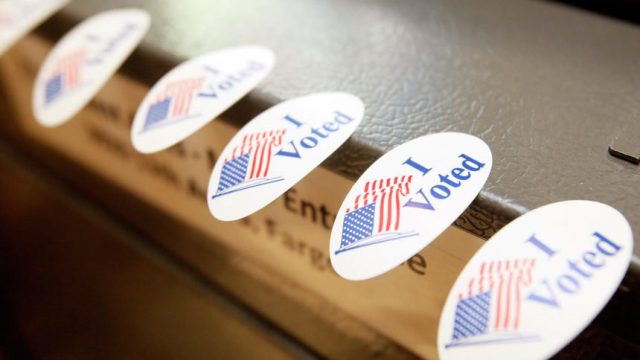Why Didn’t North Dakota’s Tribes Testify Against Voter ID Legislation They Now Say Is Voter Suppression?

“I Voted” stickers are ready for voters to take after they hand in their ballots at West Acres mall in south Fargo, N.D. on Tuesday, November 04, 2014. Carrie Snyder / The Forum
“Why would we ever disenfranchise a Native American veteran who only has a P.O. box that everybody knows when they walk into the polling booth, they know exactly who that person is, they know that they’re a North Dakota resident,” Senator Heidi Heitkamp told ABC News recently. “That’s why we don’t have registration in North Dakota because we don’t have this problem and anyone who says this isn’t about disenfranchising Native Americans is not being honest.”
Billy Ray Cyrus is even stirring the pot on this issue.
But if North Dakota’s voter ID requirements are such a clear cut case of “disenfranchising Native Americans,” why didn’t Senator Heidi Heitkamp sound the alarm last year when this law was being debated and passed by the Legislature?
For that matter, why didn’t anyone from the tribes show up and testify against this bill?
That’s what state Senator Nicole Poolman points out in a guest post here on SAB today (she was a co-sponsor of the voter ID legislation, HB1369, and also chair of the Government Affairs committee which heard testimony on the bill).
“Some news outlets have claimed the reason for our law is to disenfranchise Native American voters. Nothing could be further from the truth,” she writes. “If one looks at the minutes of our committee hearings, they will see that not a single Native American testified against this bill in committee, and no one mentioned any issue relating to addresses on the reservation.”
Poolman goes on to note that Democratic Senator Richard Marcellais, the only Native American who serves in the Legislature currently, voted for three different iterations of the bill and was supportive of it during committee discussions despite voting against the final version of the bill.
I can’t speak to why Marcellais ultimately voted against the bill, but if the legislation really is an obvious case of voter suppression why wasn’t this a bigger issue?
It almost makes it seem like the Sturm und Drang about the legislation from Heitkamp and her national media allies now is more about enraging the incumbent’s base of voters than any meritorious argument about racist voting policy.




